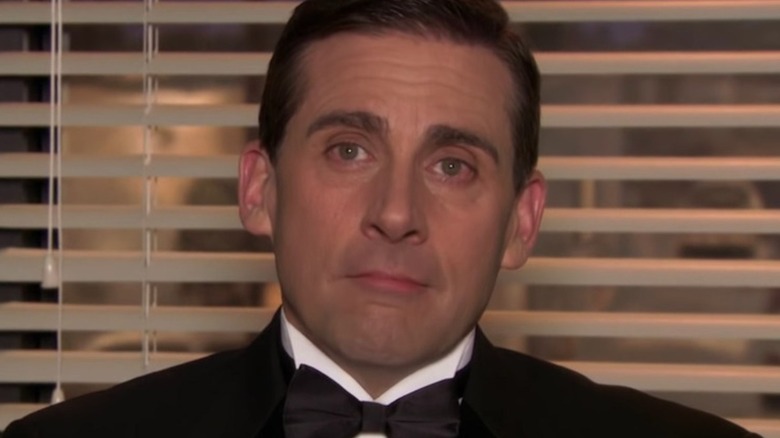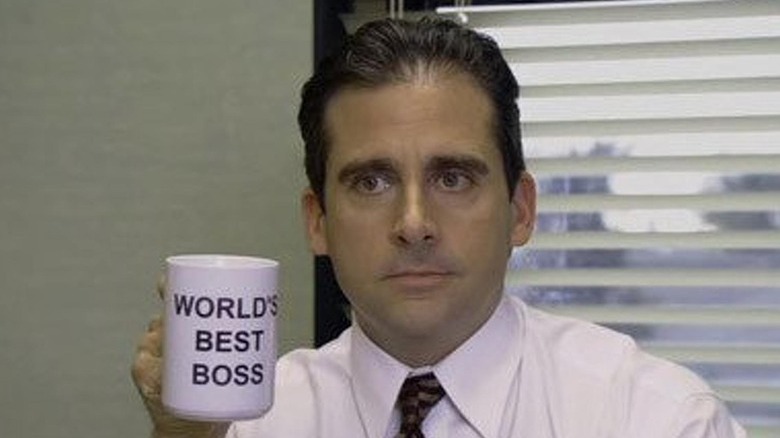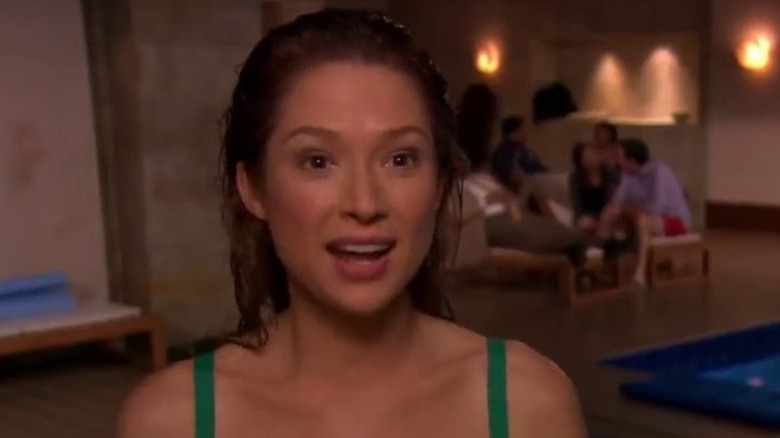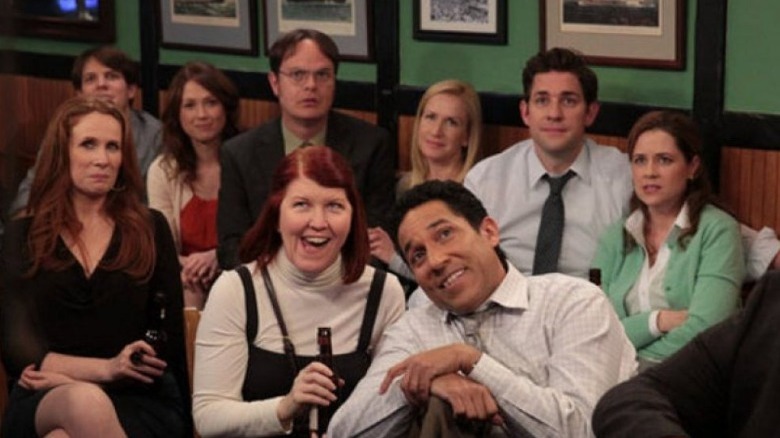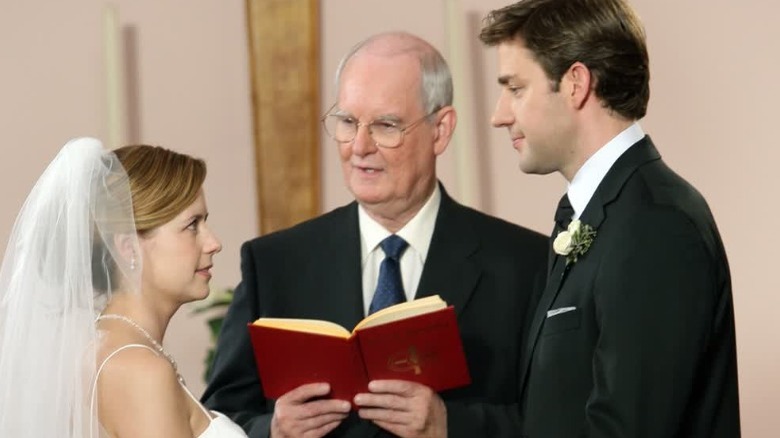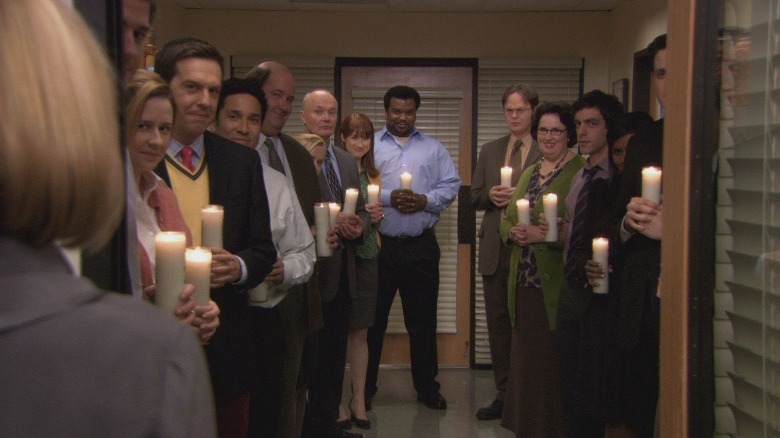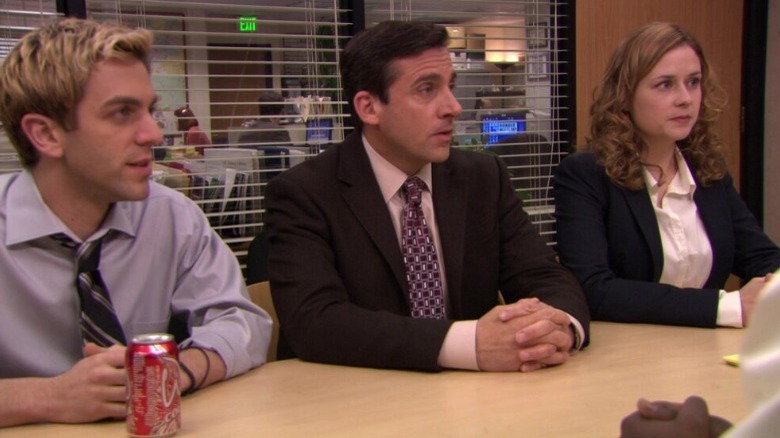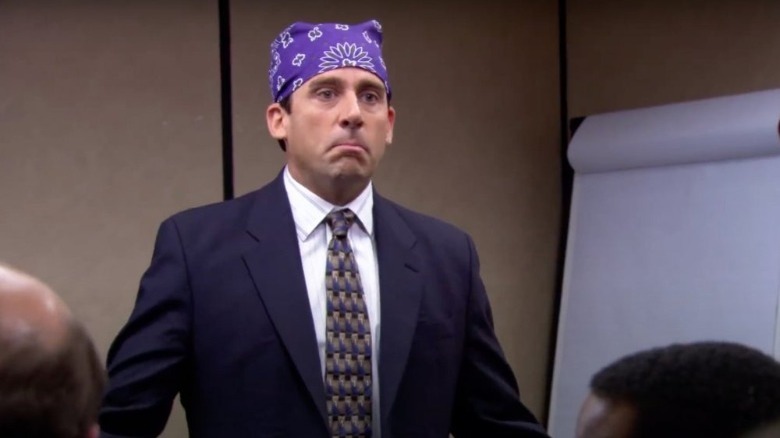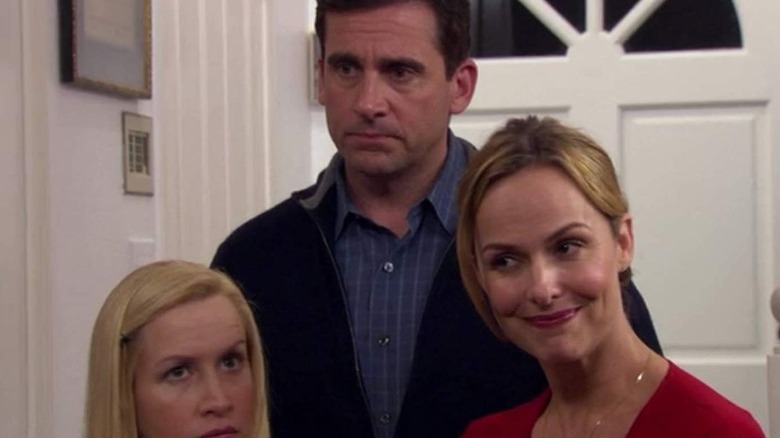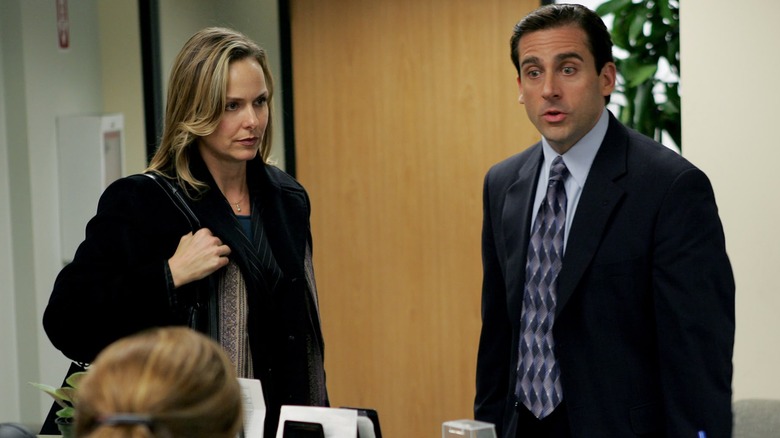Every Season Of The Office Ranked Worst To Best
Few shows have had such massive success as "The Office," the NBC sitcom that dominated screens for nine seasons from 2005 to 2013. The show's popularity has only managed to increase since it went off the air thanks to the world of streaming, with services like Netflix and Peacock bringing it to screens all over the world. The show explored the daily dalliances of the Scranton branch of the fictional paper company Dunder Mifflin, which was the subject of a documentary that provided the show's format.
With an absolutely outstanding ensemble cast led by comedy titan Steve Carell, "The Office" provides endlessly rewatchable entertainment. Its timeless qualities and terrific jokes — as well as genuinely compelling romances — make it a perfect choice to watch for just about every scenario under the sun, and people still talk about it like it's on the air today. Though there's no doubt that "The Office" is a great show, there are plenty of discussions centered around one burning question: Which season of the show stands above the rest? Thankfully, we've done the difficult work for you — here is every season of "The Office" ranked worst to best.
Season 1
"The Office" didn't exactly start with a bang, but a whimper. The show's very first episode, "Pilot," feels far too indebted to the U.K. series it's based on and largely feels like a pale imitation of a better show (though, in fairness, it gave us a truly excellent prank). Still, the show immediately rebounds with "Diversity Day," one of the boldest episodes of the show's entire run. The episode was proof that "The Office" had assembled some serious writing talent, and the show was unafraid to really take bold risks, establishing cringe comedy as one of its core tenants.
One of the main reasons the 1st season of "The Office" is the worst is the character of Michael Scott (Steve Carell), the manager of Dunder Mifflin's Scranton branch. As the show's main character, Michael in Season 1 is deeply unlikable, with greasy, slicked-back hair that matches his smarmy personality. He's offensive, cruel, and seems to be terrible at his job, and everyone in the office (except for the extremely loyal Dwight) seems to despise him. It makes for largely uncomfortable viewing and not the cringe comedy glory the show became well known for.
That said, there's still a surprising amount of greatness over the 1st season's six episodes. "Healthcare" and "The Alliance" provide some hilarious jokes with made-up diseases and quality scheming, "Basketball" delivers essential character development, and "Hot Girl" helps set the tone for the rest of the series with its squirmy, uncomfortable comedy.
Season 8
In the wake of Steve Carell's exit from the show, "The Office" found itself looking for a new direction after its main character was no longer present. Watching Season 8, it's pretty clear that the creatives were still looking for answers, as most of the season feels pretty aimless and directionless. There are some pretty big changes in front of the camera — Andy Bernard (Ed Helms) becomes the new manager, and a new character, Robert California (James Spader), becomes the company CEO who inexplicably spends half his time at the Scranton branch.
The season actually starts strongly, and Andy's extreme determination to perform as a branch manager is endearing and leads to great episodes like "The Incentive," where a huge leap in productivity comes with the consequence of him having to get a tattoo on his rear. Still, Season 8 gets a particular plotline that really damages the show. Notably, the one that centers around the company's bizarre Sabre Pyramid tablet that involves half the cast going to Tallahassee for a multiple-episode arc. The Tallahassee story puts everything at a standstill, but its egregious mistake is completely unraveling Andy, turning him from an over-eager man desperate for approval into a cartoonish villain. The arc culminated in "Get the Girl," which fans hated, and it is the single lowest-rated episode of the entire series on IMDb.
It's not all bad, as Season 8 starts strong, with some fantastic cold opens ("Are you ready for some meatballs?") and some great episodes like "Pool Party" and "Trivia," where the cast get to spend some rare time outside of the office. Sadly, the season simply never found its groove and feels wildly disjointed as a result.
Season 9
"The Office" certainly went out on a spectacular high, as its series finale may just be the best episode the series ever made. "Finale" takes place a year after the previous episode, the terrific "A.A.R.M," bringing the cast back for a panel discussing the documentary, as well as Dwight (Rainn Wilson) and Angela's (Angela Kinsey) wedding. It's was a hugely satisfying conclusion to the beloved series that gave everyone a realistic outcome, ranging from deeply satisfying to bitterly disappointing, and perfectly reflected the real-life the series sought to capture over its nine seasons. Fans certainly agree, as "Finale" has a staggering 9.8 rating on IMDb, making it the series highest-rated episode.
The reason, then, that Season 9 isn't the very best season of "The Office" is two-fold: The series is still struggling to find its footing after Carell's exit, and the primary Jim and Pam storyline is quite difficult to sit through. Andy regains his position as manager at the end of Season 8, but his once charming persona fades away into a stunningly nasty character, reminding people more of the Michael Scott of Season 1 than the charming Andy fans once knew. For Jim and Pam, it is heartbreaking for fans to watch a couple they adored so deeply fall apart at the seams, and while it felt really realistic and believable, nobody really wanted to see the couple be tested.
Season 9 also earns points for having perhaps the single funniest cold open — in "Andy's Ancestry," Jim and Pam hire an Asian actor to replace Jim, which nearly makes Dwight lose his mind.
Season 6
"The Office" really hit its stride over the first five seasons, developing a loveable cast of characters and placing them in interesting scenarios that affect the personal and professional lives that fans really can't get enough of. And Season 6 delivered on something fans were waiting pretty much since the first episode to see: Jim and Pam's wedding. And the show more succeded, as "Niagara" — the fantastic two-part episode scribed by Mindy Kaling and Greg Daniels — was nominated for an Emmy for Outstanding Writing.
Season 6 provides some other major moments, and between Pam having a baby, Michael dating Pam's mom, and another office relationship beginning between Andy and Erin (Ellie Kemper), the cast has plenty to do. The 6th season is also guilty of making some pretty strange choices that simply don't gel as naturally as other storylines in previous seasons. One of the strangest scenarios "The Office" ever plays out is having Michael and Jim be co-managers, which — despite leading to some really funny moments — never feels like a natural move for a show steeped in realism. There is also the acquisition of Dunder Mifflin by Sabre, which introduces Kathy Bates into the show as CEO Jo Bennett. Despite a great performance from Bates, the writers never manage to mine much humor from the move. The season is best remembered for the underappreciated "Scott's Tots," which fans believe contains the single most cringe-worthy moment in a series filled with them.
Season 7
Michael Scott was always a fascinating character who transformed from a deeply unlikeable boss to one of TV's most compelling characters. One of his big storylines throughout the show's run is his quest to love and be loved, which leads to a series of unfortunate relationships, especially with his former boss Jan (Melora Hardin). Season 7 marks the return to the Scranton Branch for Holly Flax (Amy Ryan), who Michael falls in love with in Season 5. One of the greatest pleasures of Season 7 is finally getting to see Michael find the love he deserves, and his perfect pairing in Holly finally solidified in the fantastic episode "Garage Sale," thanks to an unforgettable proposal.
The 7th season is also Michael Scott's last, which led to the beautiful "Goodbye, Michael" episode, in which Carell's character gets the beautiful send-off he richly deserves. The entire season is a great showcase for Michael until he departs, including the fantastic "Threat Level Midnight," which finally delivers on fans' dreams of getting to see the film Michael made.
While there's a lot of fun to be had in Season 7 of "The Office," things take a pretty noticeable dive in quality after Michael departs. The show's stunt casting of Will Ferrell as the new manager has a really unsatisfying payoff, as Ferrell's character Deangelo Vickers offers none of the charm and charisma that made Michael Scott such a fan favorite. Thankfully he's only in "The Office" for a few episodes, but Michael's departure is ultimately something that — with the exception of the occasional spark of brilliance — the show never fully recovers from.
Season 5
After a few completely fantastic seasons running back-to-back-to-back, "The Office" found itself with a challenge to remain at the same level. It's a challenge Season 5 performs admirably, but staying relevant into your 5th season of television is no easy task. The writers needed something to shake up the show without getting too crazy, and the show found exactly what it needed to keep itself on top with the Michael Scott Paper Company.
Michael Scott quitting his job at Dunder Mifflin on the eve of his 15th-anniversary party felt unimaginable a year prior, but his decision to leave and ultimately form a competing paper company provides one of the most exciting and downright hysterical multi-episode story arcs in the show. One of the season's best episodes, "Broke," provides audiences another tantalizing opportunity to see that Michael is actually really great at what he does, and seeing him shine in negotiations is one of the show's great pleasures. Though Michael ultimately returns to Dunder Mifflin as manager, it's a great surprise and a refreshing change of pace for the show that helps keep things fresh.
Season 5 is full of some really great moments, including the legendary fire safety drill in "Safety Training," Michael's Willy Wonka obsession coming to fruition in "Golden Ticket," and an awesome training session in "Customer Survey." The single most memorable moment in Season 5, however, comes in the cold open of "Frame Toby," when Michael screams "No" in dismay at Toby's (Paul Lieberstein) return to Dunder Mifflin.
Season 3
Sometimes everything in a show just clicks — the fantastic cast, clever writing, great stories — and Season 3 of "The Office" is a great example of a show in its stride. Jim and Pam's will-they-won't-they relationship is in full swing, and Dunder Mifflin is going through some big changes as the company faces the fallout of a bad economy, forcing branch closures and ultimately the merger of the Scranton and Stamford branches. Season 3 brings some great new characters into the show, including try-hard Andy Bernard and Karen Filippelli (Rashida Jones), who both shake up the office with some great new dynamics.
The season opens with the deeply uncomfortable yet extremely funny "Gay Witch Hunt," which features Oscar Martinez (Oscar Nunez) being forcibly outed by Michael, leading to one of the most cringe-tastic moments ever seen on the show. Season 3 also sees Michael's first serious long-term romantic relationship with Jan Levinson, his boss. There isn't a single bad episode in the 3rd season's 24-episode run, but the bookends are particularly exceptional. The season finale "The Job" offers some major developments, including the tumultuous Jan-Michael relationship reunited thanks to Jan getting breast enhancement surgery. It also provides some great development for the future of the show, as Jan's job is up for grabs and, in a surprising twist, ends up going to Ryan Howard (B.J. Novak).
Most importantly, "The Job" provides some desperately wanted progression in Jim and Pam's romance. At the end of the episode, Jim surprisingly returns to Scranton without his girlfriend Karen and asks Pam out to dinner, finally starting the relationship fans had been longing for.
Season 4
The 4th season of "The Office" is actually the series' second shortest season and the only one besides the first that had less than 20 episodes. Despite being shorter, it is very close to being the single best season of the show. Notably, the 4th season sees Jim and Pam's relationship blossom, providing some beautiful moments. Relationships are definitely at the core of the season because on top of Jim and Pam, the show gives us some ridiculous Jan and Michael moments and the beginnings of the torrid love triangle between Dwight, Angela, and Andy. Every single one of these characters is brought together in the magnificent "Dinner Party" episode, which provides a rare trip outside of the office as the couples endure a night from hell at Michael and Jan's condo. "Dinner Party" is definitely one of the best episodes of "The Office," providing wall-to-wall jokes and a masterclass of disfunction and cringe.
Speaking of relationships, the Season 4 finale, "Goodbye, Toby," sets up Michael's greatest romance. When Toby heads off to Costa Rica, he's replaced by Holly, who becomes Michael's wife years later, and seeing Michael fall head over heels with someone after an utterly disastrous relationship is rewarding to see. The episode also gives fans the immense pleasure of seeing Michael celebrate his arch-nemesis Toby's departure, gleefully singing "Goodbye Toby" (to the tune of "Goodbye Stranger") with a full band to the entire office. Season 4 has everything that makes "The Office" special — laughs, discomfort, and a whole lot of heart.
Season 2
After the rocky first season, "The Office" truly comes to life in its glorious 2nd season, which stands as the show's very best. The season takes on the 1st season's biggest issue and works to make Michael Scott a more palatable character for the audience. The showrunners don't waste any time in doing so, using the first episode to repair Michael's image. With a far less greasy hairdo, Michael in "The Dundies" is still pretty annoying and is clearly trying too hard, but the episode makes it clear that deep down, he is just a person desperate to be loved by everyone. During the Dundies awards ceremony, he's ruthlessly heckled by another table at Chili's, which shows just how vulnerable Michael really is. The season also gives us the first glimpse of Michael actually being good at his job — in "The Client," he shows off some wonderful interpersonal skills and closes a huge sale for the company, finally putting to rest questions of how on earth he got the manager position in the first place.
With a more dimensional and developed character in the lead role, "The Office" really starts to shine, and the will-they-won't-they relationship between Jim and Pam begins to take off and teases fans for an entire season, before their jaw-dropping kiss caps it off in the phenomenal "Casino Night." It also provides opportunities for everyone in its rich ensemble cast to showcase their talents. In particular, Dwight Schrute (Rainn Wilson), Michael's right-hand man, really comes into his own in Season 2, especially in "The Injury." Season 2 also gives us the first (and best) Christmas episode — which introduces some ridiculous antics — and the infamous teapot, which becomes an enduring symbol of Jim and Pam's incredible love story.
